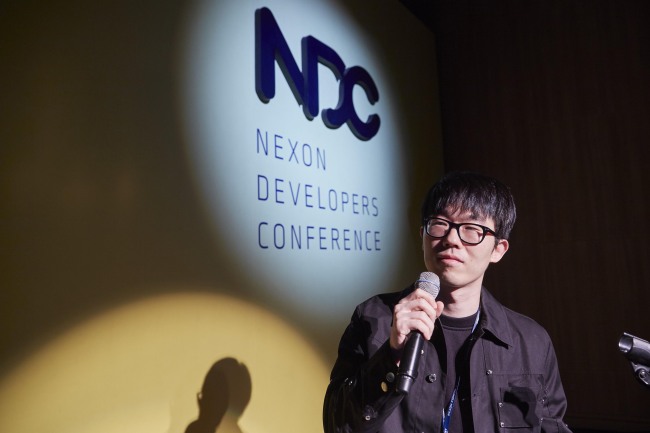With aims to develop games that are fun to play for users, video game companies have been focusing primarily on building a strong game core design -- such as devising intricate internal rules or applying quality graphics and sounds.
To achieve a fun gameplay model, however, developers are now pushed to focus more on the factors affecting users’ gaming experience, such as variations in the circumstances a user encounters in a game, which can often be difficult to detect.
And the process of finding such “blind spots” can be greatly aided by data analytics and artificial intelligence technologies, says an executive of Nexon Korea.

Nexon Korea Vice President Kang Dae-hyun (Nexon Korea)
“Big data and AI will help us broaden our views and provide unbiased information. It will help us find blind spots created by human biases,” Nexon Korea Vice President Kang Dae-hyun said during his keynote speech at this year’s Nexon Developers Conference on Monday.
“AI has become a trend of sorts these days. But at Nexon, we want to leverage AI in a way that can help us make meaningful improvements to the ‘fun’ element of gaming,” he said.
By analyzing its user game behavior patterns via machine learning, Nexon has been able to solve some very fundamental issues in its games that have gone unnoticed by human analysts, according to Kang.
For instance, Nexon discovered that an unusually high number of new users playing its first-person shooter game for the first time, were leaving the game. Traditionally, the firm would test multiple “logical” hypotheses -- users don’t know how the maneuver the controls, the game interface is too hard or the game’s difficulty level is too hard.
However, its machine learning analysis found that in fact, the new users who were leaving were those who were changing servers constantly.
What had happened? Because the FSP game was in service for so long, existing players had created an internal gameplay system of their own for each server.
Given this, when a new user joined, without prior knowledge of the “internal rules,” they could not adjust to this existing system, and became excluded. Eventually, they would lose interest in the game and leave. It’s an observation found exclusively through the AI analysis, Kang said.
Other usages of big data analytics include creating better user experiences to increase play time.
For a massively multiplayer online role-playing game, or MMORPG, Nexon could analyze a user’s game play patterns to ensure that when they log in, they are played on the same channel as other gamers with similar or mutually-beneficial playing habits.
AI systems can also catch small, yet influential, design flaws in games. In Nexon’s case it found a design flaw that led users of a particular occupation to arrive at a difficult quest too soon, making it hard to play, and thus discouraging users to continue playing.
Nexon also discovered via its big data analytics that users who receive gameplay feedback improve their gaming skills, and are thus more likely to continue playing a game. Therefore, the firm is working to build an AI-based feedback system for its games.
The company is also using AI to determine the right level of engagement for users, upon discovering that a highly competitive gameplay design does not necessarily yield the highest satisfaction from most gamers.
The Nexon Developers Conference is an annual event hosted by Nexon since 2007, which brings together game developers and industry stakeholders from Korea and elsewhere to discuss the latest issues and trends in the global gaming sector.
This year’s edition, which kicked off at Nexon Korea’s headquarters in Pangyo, Gyeonggi Province Monday, is focusing on diverse areas including game development, programming, visual arts and sounds, business marketing and virtual and augmented reality technology.
By Sohn Ji-young (
jys@heraldcorp.com)

![[AtoZ into Korean mind] Humor in Korea: Navigating the line between what's funny and not](http://res.heraldm.com/phpwas/restmb_idxmake.php?idx=645&simg=/content/image/2024/04/22/20240422050642_0.jpg&u=)
![[Exclusive] Korean military set to ban iPhones over 'security' concerns](http://res.heraldm.com/phpwas/restmb_idxmake.php?idx=645&simg=/content/image/2024/04/23/20240423050599_0.jpg&u=20240423183955)



![[Graphic News] 77% of young Koreans still financially dependent](http://res.heraldm.com/phpwas/restmb_idxmake.php?idx=645&simg=/content/image/2024/04/22/20240422050762_0.gif&u=)